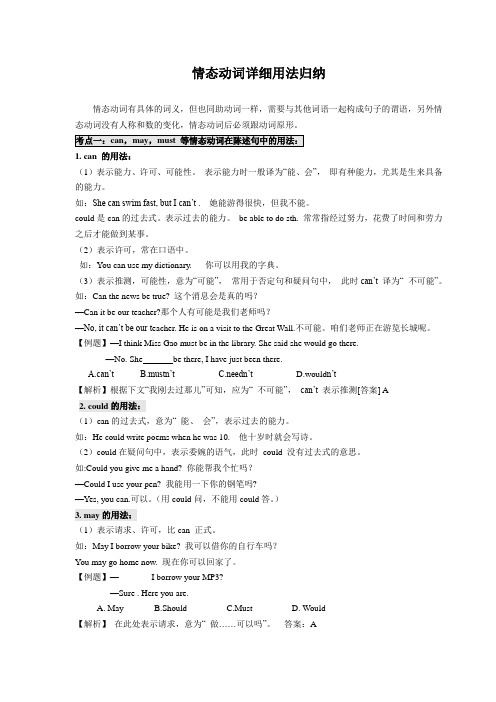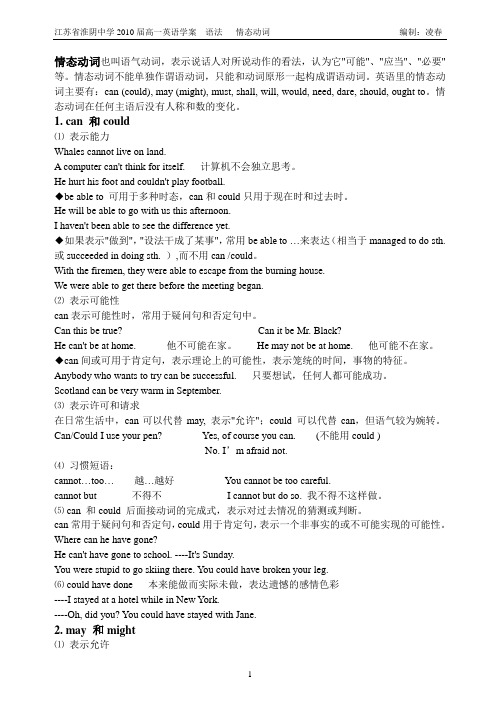情态动词归纳表
(完整版)情态动词详细用法归纳

情态动词详细用法归纳情态动词有具体的词义,但也同助动词一样,需要与其他词语一起构成句子的谓语,另外情态动词没有人称和数的变化,情态动词后必须跟动词原形。
1. can 的用法:(1)表示能力、许可、可能性。
表示能力时一般译为“能、会”,即有种能力,尤其是生来具备的能力。
如:She can swim fast, but I can’t . 她能游得很快,但我不能。
could是can的过去式。
表示过去的能力。
be able to do sth. 常常指经过努力,花费了时间和劳力之后才能做到某事。
(2)表示许可,常在口语中。
如:You can use my dictionary. 你可以用我的字典。
(3)表示推测,可能性,意为“可能”,常用于否定句和疑问句中,此时can’t 译为“ 不可能”。
如:Can the news be true? 这个消息会是真的吗?—Can it be our teacher?那个人有可能是我们老师吗?—No, it can’t be our t eacher. He is on a visit to the Great Wall.不可能。
咱们老师正在游览长城呢。
【例题】—I think Miss Gao must be in the library. She said she would go there.—No. She be there, I have just been there.A.can’tB.mustn’tC.needn’tD.would n’t【解析】根据下文“我刚去过那儿”可知,应为“ 不可能”,can’t 表示推测[答案] A2. could的用法:(1)can的过去式,意为“ 能、会”,表示过去的能力。
如:He could write poems when he was 10. 他十岁时就会写诗。
(2)could在疑问句中,表示委婉的语气,此时could 没有过去式的意思。
八年级英语中情态动词的用法归纳总结

1.情态动词可以用来表示能力和才能:- Can:表示能力和可能性。
例如:I can swim.(我会游泳)- Could:表示过去的能力和可能性。
例如:When I was young, I could run very fast.(我小的时候跑得很快)2.情态动词可以用来表示请求和许可:- Can:表示请求、许可和推测。
例如:Can I borrow your pen?(我可以借你的笔吗?)3.情态动词可以用来表示建议和意愿:- Should:表示应该、建议和责任。
例如:You should study harder.(你应该更加努力学习)- Would:表示愿意、请求和建议。
例如:Would you like some tea?(你想要一些茶吗?)4.情态动词可以用来表示可能性和推测:- Might:表示可能性和推测。
例如:It might rain tomorrow.(明天可能会下雨)- May:表示可能性和推测。
5.情态动词可以用来表示义务和必须:- Must:表示义务和必须。
例如:We must finish our homework.(我们必须完成作业)- Should:表示应该和期望。
例如:You should apologize to her.(你应该向她道歉)总结起来,八年级英语中的情态动词有can, could, may, should, would, might和must,它们可以表示能力、请求、许可、建议、意愿、可能性、推测、义务和必须。
不同的情态动词在不同的语境下有不同的用法和含义,所以需要根据具体语境和意图进行准确使用。
情态动词有哪些 用法归纳及口诀

情态动词有哪些用法归纳及口诀
情态动词是英语中很重要的一类动词,暗含着说话者的态度,因此掌握好情态动词,对于把握说话者的意图,思想有着重要的作用。
现在总结如下。
1 情态动词四大分类①只做情态动词:may, might, must..
②可做情态动词又可做实义动词:如:need, dare,can.......
③具有情态动词特征:have(had,has) to,used to, ought to
④可做情态动词又可作助动词:如:shall(should),will(would)
注意
mustn’t代表强烈禁止must 表示主观,have to 表示客观。
美式英语中常用must not 而不用mustn’t.mayn’t,mightn’t和shan’t也很少
用
常用
can (could), may (might), must, need, ought to, dare (dared), shall (should), will
(would)
1 英语情态动词用法顺口溜情态动词要记牢;动词原形来跟梢。
不管人称单复数;现在过去乐逍遥。
can 表能力和许可;也许可能may 来表;
必须一定must;should 应该来报到。
英语情态动词用法顺口溜
回答不须needn’t;mustn’t 为不必要。
英语语法情态动词

情态动词也叫语气动词,表示说话人对所说动作的看法,认为它"可能"、"应当"、"必要"等。
情态动词不能单独作谓语动词,只能和动词原形一起构成谓语动词。
英语里的情态动词主要有:can (could), may (might), must, shall, will, would, need, dare, should, ought to。
情态动词在任何主语后没有人称和数的变化。
1. can 和could⑴表示能力Whales cannot live on land.A computer can't think for itself. 计算机不会独立思考。
He hurt his foot and couldn't play football.◆be able to 可用于多种时态,can和could只用于现在时和过去时。
He will be able to go with us this afternoon.I haven't been able to see the difference yet.◆如果表示"做到","设法干成了某事",常用be able to …来表达(相当于managed to do sth. 或succeeded in doing sth. ),而不用can /could。
With the firemen, they were able to escape from the burning house.We were able to get there before the meeting began.⑵表示可能性can表示可能性时,常用于疑问句和否定句中。
Can this be true? Can it be Mr. Black?He can't be at home. 他不可能在家。
8.初中英语语法讲解-情态动词

情态动词的用法-could的用法
②表示惊异、怀疑 你怎么会这样粗心 How could you be so careless?(惊异、 怀疑的情绪) 我们当时以为那个故事不会是真的。 We thought the story could not be true. (不可能)
情态动词的用法-could的用法
情态动词的用法-Can的用法
注意: a,在口语中can常可用来代替may,来询问 或说明一件事能不能做 b, can 和 be able to在表示能力这一点是 同义词, I can speak English.=I am able to speak English. 我会说英语
情态动词的用法-could的用法
情态动词的用法- must的用法
①表示“必须”或“应当”。 我们必须依靠自己. We must rely on ourselves. 你必须在四点前干完这项工作 You must finish the work before four o’clock.
情态动词的用法- must的用法
情态动词的用法-may的用法
②表示说话人的猜测,认为某一事情“或 许”或“可能”发生 我们也许今天晚上会来看你。 We may call on you this evening.
她可能不喜欢这个地方。 She may not like this place.
情态动词的用法-may的用法
Could是 can的过去式 ①表示过去的能力或“可能性” 我年轻时跑得很快 I could run very fast when I was young. (过去的能力) 我一点也听不懂他说的话。 I couldn’t understand what he said at all.
情态动词的用法整理归纳

情态动词的用法整理归纳为了做好高中英语的备考复习,下面由小编为你精心准备了“情态动词的用法整理归纳",持续关注本站将可以持续获取更多的考试资讯!情态动词的用法整理归纳情态动词有can (could), may (might), must, have to,shall (should,will (would),dare (dared),need (needed), ought to等。
情态动词无人称和数的变化;不能单独使用,必须与其后的动词原形构成谓语。
一、 can, could1)表示能力(体力、知识、技能)。
Can you lift this heavy box?(体力)Mary can speak three languages.(知识)Can you skate?(技能)此时可用be able to代替。
Can只有一般现在时和一般过去式;而be able to则有更多的时态。
I’ll not be able to come this afternoon.当表示“经过努力才得以做成功某事”时应用be able to,不能用Can。
如:He was able to go to the party yesterday evening in spite of the heavy rain.2)表示请求和允许。
-----Can I go now?----- Yes, you can. / No,you can’t.此时可与may互换。
在疑问句中还可用could,might代替,不是过去式,只是语气更委婉,不能用于肯定句和答语中。
---- Could I come to see you tomorrow?---- Yes, you can. ( No,I’m afraid not. )3)表示客观可能性(客观原因形成的能力)。
They’ve changed the timetable,so we can go by bus instead.This hall can hold 500 people at least.4)表示推测(惊讶、怀疑、不相信的态度),用于疑问句、否定句和感叹句中。
情态动词用法归纳(全)精编版

• 一: can (could)的形式和用法
时态
肯定式 否定式 缩略否定式
现在时 can
cannot can't
过去式 could could not couldn't
一、 can, could
1) 表示能力(体力、知识、技能)。 Can you lift this heavy box?(体力) Mary can speak three languages.(知识) Can you skate?(技能) 备注:此时可用be able to代替。Can只有一般现在时和一般过 去式;而be able to则有更多的时态。 eg: I’ll not be able to come this afternoon.
The director is alone now,So you may see him now . 局长现在是一个人,所以你可以现在去见他。 might 用于疑问句,语气更委婉,如: might I join you ? 我可以参加你们一起吗?
3) 表责备,只用might,用于肯定句,可用一般式和 完成式,完成式则表未实现的动作,如:
1. How dare you say I’m unfair? 2. He daren’t speak English before such a crowd, dare he? 3. If we dared not go there that day, we couldn’t get the beautiful
may(might)有以下几种形式:
时态 现在式 过去式
肯定式 may might
否定式 缩略否定式
may not
mayn't
might not mightn't
高中情态动词归纳

情态动词用法归纳情态动词有can (could), may (might), must, have to, shall (should, will (would), dare (dared), need (needed), ought to等。
情态动词无人称和数的变化;不能单独使用,必须与其后的动词原形构成谓语一、can, could1) 表示能力(体力、知识、技能)。
Can you lift this heavy box?(体力)Mary can speak three languages.(知识)Can you skate?(技能)此时可用be able to代替。
Can只有一般现在时和一般过去式;而be able to则有更多的时态。
I’ll not be able to come this afternoon.当表示“经过努力才得以做成功某事”时应用be able to,不能用Can。
如:He was able to go to the party yesterday evening in spite of the heavy rain.2) 表示请求和允许。
-----Can I go now?----- Yes, you can. / No, you can’t.此时可与may互换。
在疑问句中还可用could, might代替,不是过去式,只是语气更委婉,不能用于肯定句和答语中。
---- Could I come to see you tomorrow?---- Yes, you can. ( No, I’m afraid not. )3) 表示客观可能性(客观原因形成的能力)。
They’ve changed the time table, so we can go by bus instead.This hall can hold 500 people at least.4) 表示推测(惊讶、怀疑、不相信的态度),用于疑问句、否定句和感叹句中。
- 1、下载文档前请自行甄别文档内容的完整性,平台不提供额外的编辑、内容补充、找答案等附加服务。
- 2、"仅部分预览"的文档,不可在线预览部分如存在完整性等问题,可反馈申请退款(可完整预览的文档不适用该条件!)。
- 3、如文档侵犯您的权益,请联系客服反馈,我们会尽快为您处理(人工客服工作时间:9:00-18:30)。
情态动词归纳表情态V词义&用法注意事项特殊用法can could 1.表具备某种能力Can表现在能力;Could表示过去能力.可用be able to代替;was/were able to to表示成功做了某事(1)表惊异、怀疑、不相信、不耐烦等。
(此意常用于否定句、疑问句或惊叹句语气)Can/Could this be true?(2)can not…too\enough表示"无论怎样``````也不过分","越``````越好":You can't be too careful.2.表请求和允许①请求用could 语气委婉②允许不用could.3.表“可能性”①can用于否定和疑问句(could不限)②can (be)表示有时候会(常与sometimes, at times 连用)may might 1.表请求和允许①请求用might语气更委婉。
②允许时用may,表示“可以”(表示允许时不用might)。
(1)may/might well+V原形:表"完全可能,,很可能"= be very likely to:He maywell be proud for his son.(2)may/might as well+V原形:"最好,满可以,倒不如"You may as well stay here over night.2.表可能性“也许”此意常用于肯定句。
(might可能最小)3表祝愿固定句型为“May+主语+V原型”:May you succeed!must 1.表“必须”①must多表主观、现在/将来义务;have to多表客观、过去义务②mustn't表"禁止";否定用needn't /don't have to (1)表示必然结果:All men must die.人固有一死。
(2)表示一种与说话人愿望相反、不耐烦的感情色彩,可译为“一定要、偏偏、非要”:If you must know, her name is Mary.2.表推测:“肯定是、准是”只用于肯定句。
在否定句/疑问句中用can/couldwill would 1.表意愿,决心等Would此时为will过去式,无意义差别(1)will表命令(说话者确定命令一定会得到执行)或允诺:You will report tome afterwards.(命令)They will getenough money from me.(允诺)(2)可用于祈使句附加疑问句(反义疑问句):(此时would比will委婉) Don’t gonow, will you?(3)woul短语:would rather/wouldprefer宁愿;would like/would love喜欢/想要(见注意①)2.表经常性,习惯性,倾向性,Would表过去反复的动作/某种倾向(相对于used to无“现已无此习惯”之义。
)3.表功能,性质叙述真理:The tree will leave withoutwater for 3 months.4.表估计:“想必,大概”(只时态区别)此意表对目前事物的预料。
That will bethe postman ringing.(would表示过去/现在;will表示现在/将来)5.表“请求/要求”(Will you?)此意用于疑问句,常与you连用Will you give me a piece of paper?shall (shan’t)1.表征求意见(“好不好”)用在第一、三人称Shall the reporters waitoutside or what?点2其他示例:He shall have the book when I finishreading.(允诺)You shall fail if you don't work harder.(警告)You shall come at once.(命令)2.表允诺、威胁、警告、命令或根据规定有义务做用于第二、第三人称Passengers shall not talk with the driverwhile the bus is moving3.表规章、法令、预言:“必须”用于所有人称Every competitor shall wear a numbershould ought to 1.表示道义上的责任,义务或要求,有时表示劝告:You ought to /should paymore attention to what your lawyer says.(1)should 用于疑问句中表示说话人对某事不能理解,惋惜,感到意外,赞叹,愤怒、惊异等感情,意为“竟会”,有时也用于陈述句中(2)Should还可以用在if引导的条件从句,表示一件事听起来可能性很小,但也不是完全没有可能,相当于“万一”的意思。
(见注意②)2.表示推测和可能性,是“(按理说)应该”之意肯定的语气没有must用于推测时强This pen ought to /should be yours.3.表示说话人的一种谦逊,客气,委婉的语气此意常用于第一人称时:You are mistaken , I should say . (依我看你是搞错了)高考热点透视热点一:表猜测的情态动词的用法。
词形使用场合对现在和未来的推测对过去事情的推测must 肯定句must+动词原形must have donemay/might 肯定句、否定句may+动词原形may/might have donecan/could 否定句、疑问句can/could +动词原形can/could have doneshould 肯定句、否定句、疑问句用来表示一种估计的情况“按理会/估计会”should+动词原形should have done热点二:情态动词+have done情态动词+have done的用法有两种含义:1. 对过去情况的猜测。
由表猜测的情态动词+have done构成。
上表已经提到。
2. 表示与过去事实的主观设想。
有轻微的责备、后悔之意。
请参看下表:情态动词+havedone 用法例句must have done 对过去进行推测表“想必、、准是一定做了”The light were out. They must have been asleep.can have done can’t have done 否定、疑问句中,表“怀疑和不肯定”He can’t have forgotten it.Can he have gone to his aunt’s?could have done couldn’t have done 表“本来可以做某事的(却没有)否定表“不可能”You could have done better, but you were toocareless.Mr wang couldn’t have gone to Beijing, for Isaw him just now.might have done 表“本来应该或可以/能做某事的(却没有)You might have given me more help, though you were busy.should/ought to have done 用于肯定句中时,表示“本该做某事”,而实际上未做;用于否定句中时,则表示不该做的事反而做了。
You should/ought to have been more careful.You shouldn’t have spoken to your parents inthis way.needn’t have done表示做了本来不必去做的事。
The weather turned out fine. You needn’t have taken your umbrella with you.had better have done 表示“当时做了某事就好了”,其否定句表相反的含义。
You had better have started earlier.You had better not have quarrelled with her.would rather havedone表示“当时宁愿做了某事”,其否定句表相反的含义。
两者都表“后悔”之意。
I would rather have taken her advice.I raised objections at the meeting, but now I would rather not have done that.Would like/love to have done 表示愿意做某事,但未做成。
I would love to have gone to the party last night,but I had to work extra hours to finish a report.热点三:shall,will,must等1. Shall ①用于第一人称疑问句中表示说话人征求对方的意见或向对方请求。
例:—The room is so dirty. _______ we clean it?—Of course. ( 03 上海春招)A. WillB. ShallC. WouldD. Do②用于第二人称陈述句表示说话人或他人的意图、命令、允诺、警告、命令等。
例:“The interest _______ be divided into five parts, according to the agreement made by both sides,” declared the judge. (04 重庆,24)A. mayB. shouldC. mustD. shall2. Will ①表示意愿或意志。
例:I __________ argue with you.②当主语是物时,则表示“不起作用”。
例:The drawer _________ shut.3. Must 表“必须、一定要”。
例:— Who is the girl standing over there?— Well, if you _______ know, her name is Mabel. (02,天津)A. mayB. canC. mustD. shall。
